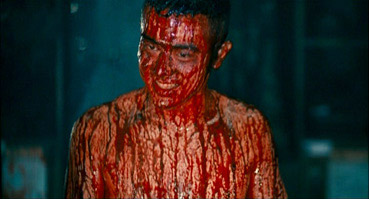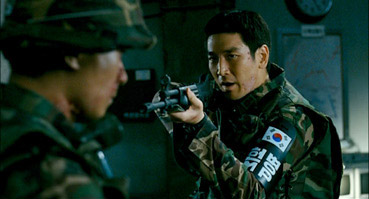|
Good horror cinema, more often than not, requires the complete isolation of its protagonists, either by emotional or physical means. The latter is particularly important if you are to render your potential victims helpless, a situation that the rise of the ubiquitous mobile phone has made tougher to arrange. For many would-be horror scriptwriters or directors the first question is how to convincingly segregate their characters from society in order to start threatening them. It is, after all, the complete isolation of the crew members of Ridley Scott's Alien, far beyond the reach of either help or even radio communication, that helps make it such a potent example of cinematic terror so many years on.
For director Kong Su-chang the answer lies in sending his potential victims, here a Korean army platoon, to a distant guard post to investigate a breakdown in communication with its former occupants. Genre fans won't be too surprised to find they've all been brutally murdered, well all except the blood-soaked, maniacally grinning and axe-wielding Corporal Kang. No prizes for guessing what happened here, then. The big question is why, and that's what serious-faced Sergeant Major Noh is there to uncover.

Kang himself would obviously be a good place to start but he's not talking. Another avenue for possible answers opens when a body count reveals that one of the slaughtered soldiers is unaccounted for. He's eventually identified as Sergeant Yoo when they find him alive and gnawing on a freshly slaughtered guard dog. The trouble is, he's not saying much either, but he's real keen to get the hell out of there. Horror turns to mystery as Noh searches for answers and we're invited to do likewise, but time is not on the sergeant-major's side. Unrelenting bad weather blocks the only route out, and Noh's men soon start exhibiting irrational and dangerous behaviour.
Korean horror has of late slipped into the same sort of recycle mode that has blighted much of the recent output from the once fresh and innovative Eastern horror industry, where the borrowings now extend beyond J-horror hits to include past American favourites. You won't have to look far to spot the influences here – Kong's own previous army/horror crossover R-point aside, much of Guard Post has been absorbed from John Carpenter's The Thing, from its isolated all-male unit and early slaughter of the camp dogs to the growing paranoia over who might be infected and what the wider consequences for the outside world might be.
As the soldiers speculate over whether the deadly psychosis is biological or paranormal in nature, or perhaps even a combination of the two, the disturbing incidents multiply and the bodies start to pile up. Noh begins to get the answers he's been looking for with the help of some diary entries, an ominous camcorder message, and Yoo's decision to open up about what went on prior to the platoon's arrival, incidents recreated in flashbacks that I repeatedly confused with the present. Don't worry, that's probably just me.
Nicely shot, intermittently intriguing, and about 20 minutes longer than it needs to be, Guard Post borrows, occasionally confuses and doesn't boast too many narrative surprises. But it does build an effective atmosphere of gloomy dread, and deliver on the early promise of some grim violence. It even boasts the odd moment of inventive character detail, as with the soldier who cheerily wears a diving mask to peel onions, or the accidental firearm discharge that almost starts a war with the North Korean guard post across the border. It's a damned shame there weren't more such character-engaging moments – had I got to know the soldiers better I would no doubt have cared a little more for their fate.
A generally solid 1.85:1 anamorphic transfer, at least by NTSC to PAL conversion standards, with strong colours and solid contrast. Grain is more visible in the darker scenes, and upscaling to HD really exaggerates this, at least on my TV. On the whole, though, the image is clean and has an appropriately gritty edge, though detail is slightly softened by the conversion process. Some sources have quoted the original aspect ratio as 2.35:1, but the composition here looks about right, and group shots appear to have been arranged for 1.85:1 framing.

A choice of soundtracks between Dolby 2.0 stereo and 5.1 surround leaves the latter a clear winner, with some very specific and effective use of the surrounds on both dialogue and sound effects. The lower frequencies are not as beefy as you'd expect, though – a late film explosion failed to rock the house.
The Briefing Room: Behind the Scenes (31:10)
An unstructured and commentary-free collection of behind-the-scenes footage, mixed with production stills, interviews with cast members, and film extracts. The offbeat highlight sees two representatives of Cho Hyun-jea's fan club turn up on set to cook dinner for the cast and crew.
The Barracks: Set Design (13:43)
Something of a show reel for the production designer, with each of the sets shown in its construction and completion, usually as a series of stills, then in use in an appropriate film extract. The exterior compound set is covered in a bit more detail. Of interest, but we learn nothing about the thinking behind their design or construction.
Guard Post Head Office: Special Effects and Make-Up (9:55)
More commentary-free behind-the-scenes footage, this time concentrating on the bloodier make-up effects. A little more interesting than the set design featurette because we get to see how some of the effects were done, and the dummy created for a rifle-in-the-mouth suicide is disturbingly convincing. It's also rather fun to watch actor Lee Young-hoon, who plays Kang, being slowly covered in blood, and watch carefully for the moment one of the make-up men nearly slips up on the spilt liquid. Brief coverage of a pyrotechnic effect at the end feels tagged on.
Storyboard (9:57)
Selected sequences are intercut with the storyboards of same – by the halfway mark it's just the storyboards laid over the soundtrack. Again of interest, but the boards themselves are not detailed enough to warrant almost ten minutes of screen time, at least without any accompanying commentary.
Trailer Gallery
Choose between the Original Theatrical Trailer (1:52) and the Promo Trailer (2:04), but don't select the latter until after watching the main feature, as it contains a few spoilers.
An uneven, sometimes involving but not exactly outstanding blend of war, mystery and horror movie elements, well made but a bit short on character depth and detail. Cine Asia's DVD boasts a decent enough transfer, but the extras, despite their number and collective length, are a bit thin on substance.
|